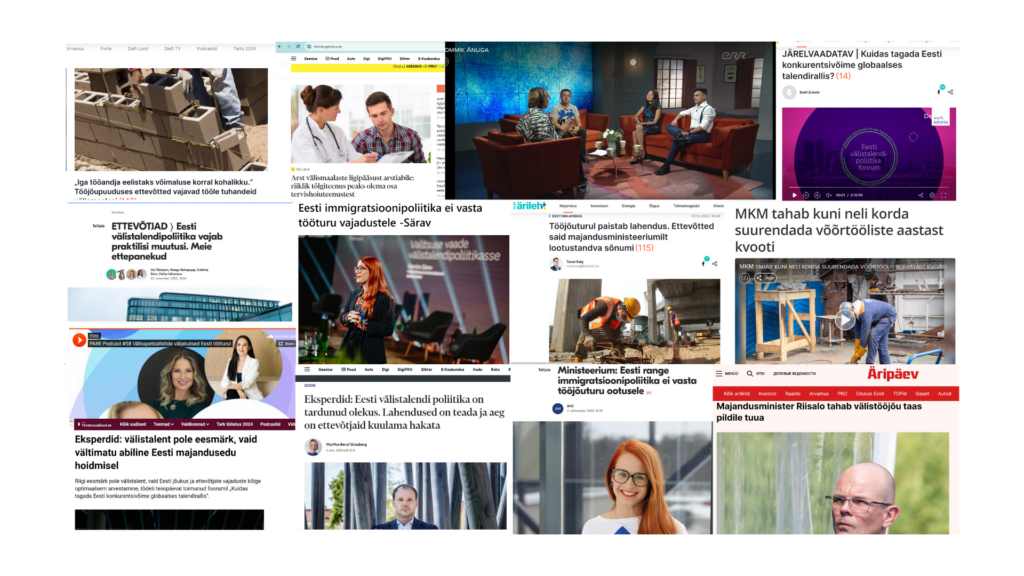How to talk about a topic you don’t want to talk about?


The solution that will make Estonia’s economy thrive has always been sought, but many experts believe that solutions are in front of us. So how can we talk about bringing foreign talent, or foreign labour, to Estonia in public and do it in such a way that it is actually a driving force, not an exit force?
In November, we helped the Work in Estonia team organise a forum on foreign talent policy in Estonia, which focused on the ideas and needs of representatives of different professions and sectors regarding foreign talent policy for skilled labour. The result was a multifaceted, in-depth, substantive and enjoyable debate that was, above all, solution-oriented, spilling over into the media’s pages and society at large.
CHOOSE THE RIGHT SPEAKERS AND OPEN UP THROUGH STORIES
Generally, one key factor in communication always determines the sequence of events that follow – the story. Telling a story well and using the right spokespeople can make complex or challenging issues understandable. The subject must be told by experts in their field who have a broader view and believe in what they are saying. Perhaps most importantly, people need to have faith to talk about it – because if you don’t believe in what you are doing or talking about, why should others?
If you don’t believe in your actions, why should others?
To open up the sometimes complex topic of external lending policy, we brought in experts from various fields, from economics and employers to the health system, to speak at the Forum and discuss the issue. With their stories and concrete examples, all of these people painted a comprehensive picture of what is happening in Estonia’s external lending policy and what still needs to be fixed or happening, but for which there are high expectations.
CHOOSE THE RIGHT APPROACH
Stories are always best told by real people or companies with their real challenges and ideas. We focused our Forum communication entirely on content and stories. It is good to use the media to raise different perspectives and open up the problem and solutions for such socially important, multifaceted issues. To this end, the team and I took Estonia’s external lending policy apart:
- In cooperation with the Work in Estonia team, we mapped out the different challenges of foreign lending policy and wanted to tell the story of Estonian foreign lending policy through these challenges;
- According to the challenges (or even the joys), we mapped out the appropriate channels and publications to deliver the valuable content and story exclusively from the speakers.
To do this, it was necessary to engage with representatives from different sectors – primarily talented people themselves, but also family doctors, offshore wind farm developers, employers, businesses, people who deal with talent every day, etc. – and to listen to what the missing pieces of the puzzle are in external talent policy. Along with the gaps came the things that Estonia has done well, and we didn’t leave those unsaid either because they are part of the story.
FIND THE RIGHT MOMENT
It’s easy to say that you need to find the right moment to talk about something, but many things cannot be discussed at any given moment. There may not be the right moment to talk about anything at any given time because of events in the world or Estonian society.
When the state of the Estonian economy and the search for solutions is being discussed by politicians, experts, employers, various professional associations and people in social media spaces, it is clear that this is one of the topics people are interested in right now. Price rises and interest rate hikes have been just one part of what has got many people thinking more about the economy than before and has increased their interest in the subject more broadly. So, it was an opportune moment to bring the topic of external lending policy into the economic debate.
Otto Pukk, president of the electronics industry group Incap and chairman of the Estonian Electronics Industry Association council, told Delfi Ärilehe that if you want to be world-class, you need people with world-class skills. According to the OSKA report, Estonia needs 2,600 more ICT specialists yearly to maintain the current level. There is a shortage of talent in other areas, too.

Both the general public interest in economic issues and the thought-provoking facts and stories that emerged after the Forum confirmed that it was the right moment to talk about external lending policy and the challenges it faces. There was a willingness and interest from representatives of different sectors, policy makers and the media.
What happened after the story was told?
As mentioned, the Forum opened a constructive and meaningful discussion that spilt over into the media and the pages of the press. The Vice-Chancellor of the Ministry of Economic Affairs and Communications promised to make dealing with the immigration quota, together with the external migration policy in general, a goal of his term of office. The minister spoke about bringing foreign labour to Estonia and the need for Estonia to focus on foreign investment policy, especially in terms of a skilled labour force of talent.
Through the stories of people and companies, we reached the next and long-awaited level in the Estonian economy – finally, society is ready to talk about foreign labour and come up with the right solutions. On a positive note, a direction has also been taken to give substance to Estonia’s economic policy, including the external labour policy, and to take the next necessary steps.
25
media coverages analyzing the topic
12
speakers from different fields
powerful subject
= real change
Meta team

Merilyn Säde Senior Consultant

